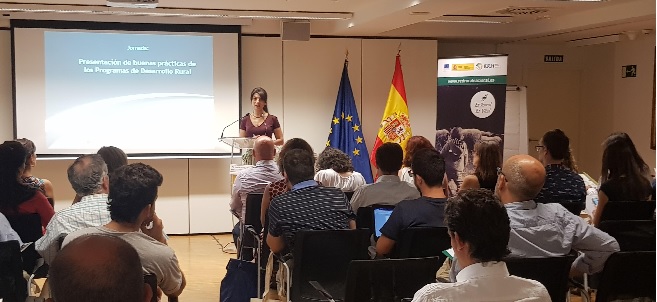
03 de July de 2019
03/07/2019. The National Rural Network organized the "Presentation of Good Practices in Rural Development Programs" event, held on July 2, 2019. The event featured a publication on good practices and created a space for meeting and mutual learning among multiple stakeholders and actors in rural development in our country. The main objective was to highlight some experiences related to rural areas and to transfer this knowledge to other territories and sectors.
The document presented is a " Compilation of good practice projects from Rural Development Programs ," in which each autonomous community has proposed a series of RDP projects that can serve as examples and prototypes for replication in other programs, territories, or different communities.
The National Rural Network has been responsible for producing this publication, fulfilling its purpose of disseminating and publicizing various projects being developed in rural areas and contributing to their revitalization.
For the compilation, projects funded by Rural Development Programs were selected, considered to be good practices by the promoters themselves and the various Managing Authorities that participated.
The examples have been promoted through various RDP measures and classified according to five priorities: food chain and risk management in the agricultural sector, farm competitiveness, entrepreneurship and social innovation, innovation and knowledge transfer, and finally, environment and climate change.
In addition to the official presentation of the publication, the event featured two expert panels , where participants learned about eight relevant projects from different autonomous communities. A roundtable discussion included discussions on the definition and categorization of best practices, their compilation, assessment, and dissemination, among other aspects.
The first of the projects presented at the expert panels was the Agri-Food Knowledge Exchange Network (RICA), managed by the Aragon Agri-Food Research and Technology Centre (CITA), which stands out for its work promoting and disseminating the professionalization of farmers, ranchers and agri-food industries , through a powerful interactive tool that responds to the need for information and technical knowledge in the agri-food sector.
The second project, "Prepared 2nd and 4th range products using organic agricultural production," managed by the Association of Organic Farmers of Mallorca (APAEMA) , has created new products processed from fresh local foods, which bear the organic farming seal.
The company Oleum Laguna SL . , belonging to the Community of Madrid, has presented its third project, explaining how it produces extra virgin organic olive oil, transforming it into a high-quality, natural, artisanal, and local product, and which stands out for the environmental sustainability of its facilities and operational operations.
The next good practice presented was the "Circular Bioeconomy pilot project for local organic waste with a social dimension", located in Navarra and managed by the Josenea Labor Association . This project is of great environmental importance that contributes to social inclusion and adds value to the treatment of local urban waste, recycling it for on-site use as organic fertilizer.
The “ Arrenca” programme , the fifth good practice, is an individual action by the Consorci GAL Noguera-Segrià , within the framework of the ODISSEU cooperation project for the return of young people to the rural world, which supports the fight against depopulation .
The Andalusian School of Shepherds , its sixth experience, is a training program for new shepherds to maintain the traditional activity of extensive grazing and encourage the incorporation of shepherds into professional livestock farming, considering them as true environmental managers and improving their image and social prestige in society.
The Region of Murcia , through its Directorate General for Water, has promoted a project for a solar regulation and pumping reservoir for the Campos Alto Lorca Irrigation Community, an example of how to promote an environmentally and economically efficient system , both in terms of saving water resources and energy.
Finally, the experience of the Extremadura region in promoting investments for the joint marketing of cattle was discussed, which demonstrates the commitment of livestock farmers to increasing the market competitiveness of their production by promoting fattening and joint marketing.
Finally, the event allowed many stakeholders and actors in the rural world to reflect together on how to properly identify and categorize good practices in this area, their classification and assessment, and the tools and methods necessary for optimal public dissemination, thus enabling replication and transfer, adapting to other environments and territories.











